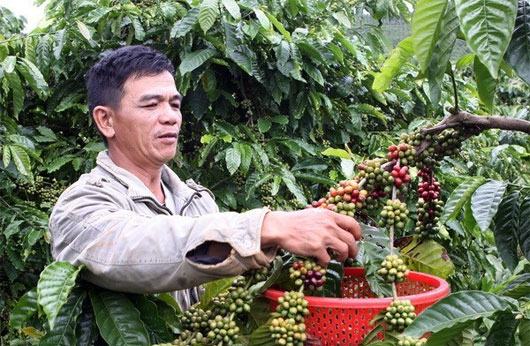The Central Highlands breeds new coffee varieties for sustainable development
The Central Highlands Agro-Forestry Science and Technology Institute has bred and selected 21 new coffee varieties and researched and transferred technical advances to help farmers and coffee production enterprises effectively. than.
The Central Highlands Agro-Forestry Science and Technology Institute has successfully researched and bred new varieties of Robusta coffee and was recognized by the Ministry of Agriculture and Rural Development.
These varieties of Robusta coffee have very high yield potential, reaching 4.5-7.3 tons of coffee beans / ha, especially the grain size has been significantly improved, the weight of 100 seeds reaches from 17 to 23 grams compared to the average weight of 100 grains in production today only reaches 13-4 grams. These are also coffee varieties with high resistance to rust.
At the same time, the Institute has also successfully selected and bred 10 new varieties of coffee tea, of which two varieties TN1 and TN2 have been allowed to be regionalized by the Ministry of Agriculture and Rural Development. These are also coffee varieties with high yield, resistance to pests and diseases, especially rust.

Harvesting coffee.(Photo: Quang Quyet / VNA)
Along with the new breeding, Tay Nguyen Agriculture and Forestry Science Institute has also developed and transferred the procedures for taking care of Robusta and Tea coffee with high economic efficiency with the application of measures. techniques to coffee farmers and enterprises, such as the application of advanced techniques to fertilize soil fertility and crop productivity.
Specifically, the Institute has transferred the transplant process to change coffee varieties with a success rate of over 90%. This is one of the technical advances applied by many farmers, coffee production and business enterprises with high economic efficiency in changing low-economic and low-yield coffee varieties by grafting selected new varieties of Robusta coffee.
According to the Central Highlands Agricultural and Forestry Science Institute, the cost of replacement graft is many times lower than that of new plantings and after 3 years, the grafted coffee plant has a stable yield of 20-25kg fruits / tree, high. more than 10 to 15 kg of old coffee varieties / tree.
The Institute has also focused on researching and providing technical solutions in coffee coffee rejuvenation, transferring technical advances in diversifying crops in coffee gardens by intercropping long-term commodity crops. years such as intercropping avocado, durian, pepper .
In addition, the Central Highlands Agro-Forestry Science and Technology Institute has also studied and transferred to farmers and coffee production enterprises effective control procedures on some main pests and diseases on trees. coffee such as mealybugs, fruit beetles, branch borers, rust, dry branches, pink mushrooms . contribute to improving production efficiency, limiting the negative impacts of plant protection chemicals. environment as well as farm households' health in coffee production .
Currently, the country has nearly 622,000 hectares of coffee, of which over 90% of the area is concentrated in the Central Highlands provinces. Also according to the Central Highlands Agricultural and Forestry Science Institute, thanks to good application of technical advances in production, Vietnam's coffee yield is currently at the highest level among coffee producing countries (reaching 23 , 5 quintals of coffee beans / ha) and 2.3 to 3 times higher than the average yield of the world.
- Choose 21 varieties of coffee with high yield and pest resistance
- Tea coffee brings many benefits to the people
- Dak Lak produces coffee adapting to climate change
- Cicada larvae 'break' coffee!
- Scientists found 8 new orchids in the Central Highlands
- Central and Central Highlands worry that El Nino will appear
- Starting Robocon 2012 in the Central region - Central Highlands
- Cultural space of Cong Chieng Highlands
- Beauty of birds in the South Central Highlands
- Tropical depressions cause heavy rain in the Central and Central Highlands
- Poisonous picture of the elephant hunt in the Central Highlands 100 years ago
- Record flooding in Phu Quoc and Central Highlands due to the monsoon in Australia
 'Barefoot engineer' invents a pipeless pump
'Barefoot engineer' invents a pipeless pump Process of handling dead pigs due to disease
Process of handling dead pigs due to disease Radiometer
Radiometer Warp Engine: Technology brings us closer to the speed of light
Warp Engine: Technology brings us closer to the speed of light